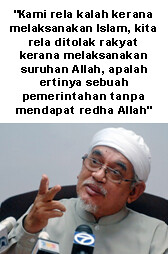Posted in Biblical Textual Criticism, Concept of God, Hermeneutics at 10:25 am by Kam Weng
TRANSLATING THE NAMES OF GOD: Recent experience from Indonesia and Malaysia
D. Soesilo
Note – This is partial reproduction of the original article. Reproduced with permission from the author
The Situation in Malaysia
The situation in Malaysia in regard to the use of the divine names is different to that in Indonesia in one important respect, which has more to do with politics than with language. It is that some years ago some states and the federal government prohibited the use of the name Allah by non-Muslims.
It is partly fear of this that has led some organisations to make changes in the rendering of the names of God in Malay and Indonesian, in both their own writing and in quoting of Scripture. (Each time the word Allah “God” occurs, it has been consistently changed to Tuhan “Lord”, with the result that there is no difference between the renderings of the two Hebrew names YHWH and Elohim.)
In response to this situation the Heads of Malaysian Churches met in Kuala Lumpur in 1985 (sponsored by the Bible Society of Malaysia) as well as in the 1989 Kuching Consultation of the Heads of Churches (sponsored by the Christian Federation of Malaysia). At both these
meetings there were unanimous decisions to keep the name Allah; and as the servant of the Malaysian churches, the Bible Society of Malaysia honoured this decision when it published the revised Malay Bible (including the deuterocanonical books), Alkitab Berita Baik, (1996).
There are five reasons why it is legitimate to use Allah among Christians.
They are as follows:
1. The loan word Allah is the Arabic equivalent of the Hebrew names of God El, Elohim, Eloah in the Hebrew Old Testament.
2. Arab Christians from before the dawn of Islam have been praying to Allah, and Allah was used by Christian theologians writing in Arabic. So the Christian usage of Allah is actually older than Islam.
3. Allah is the word used for “God” in all Arabic versions of the Bible from the old Arabic Bible all the way to the modern Arabic Bible (Today’s Arabic Version).
4. Christians in countries like Algeria, Egypt, Iraq, Jordan, Lebanon, Indonesia, Malaysia, Brunei, and other places in Asia and Africa where the languages are in contact with Arabic, have almost all been using the word Allah as the Creator God and the God and Father of the Lord Jesus Christ.
5. Last but not least, in Malay and Indonesian the word Allah has been used continuously from the time of the first printed edition of Matthew’s Gospel in Malay (A.C. Ruyl, 1629). It was used in the first complete Malay Bible (M. Leijdecker, 1733), and in the second complete Malay Bible (H.C Klinkert, 1879), and has been used in other published Scriptures up to the
present day.
The situation in Indonesia
It is worth pointing out that, unlike Malaysia, in Indonesia Allah is accepted as the Supreme Being for all people. Thus there has never been a prohibition such as the one in Malaysia. The definition of Allah in the Indonesian Dictionary Kamus Besar Bahasa Indonesia is an all inclusive definition:
Allah Nama Tuhan dalam bahasa Arab, pencipta alam semesta yang mahasempurna; Tuhan yang Maha Esa yang disembah oleh orang yang beriman
“The name of the Lord in Arabic, creator of the universe who is most perfect; the Lord, the one and only God who is worshipped by people of faith.”
Recently, however, 30 000 copies of a translation of the Bible, Kitab Suci: Torat dan Injil were printed by an organisation in Indonesia, where the text of the Indonesian formal translation published by the Indonesian Bible Society has been systematically changed. This has been done by using some kind of consistency table, so that the name Jesus is written as Yesua, “Jesus Christ” is translated Yesua Hamasiah, the name YHWH is transliterated as YAHWE, and “God” is transliterated from the Hebrew Elohim as Eloim. This form Eloim is also used for “God” in the New Testament (Greek Theos); thus readers find Eloim all over the New Testament as well as the Old Testament.
The explanation for this use of Eloim given in the brochure distributed by the organisation is that Allah is a pagan god, the god of the Arabs – thus Christians cannot use Allah. (This organisation is working among communities and groups of people that include Muslims.) Some examples from the text of this Bible are:
Dengarlah, hal orang Israel: YAHWE itu Eloim kita. YAHWE itu esa!
“Listen O nation of Israel: YAHWE is our Eloim. YAHWE is one!”
(Deut 6.4)
Jawab Yesua: “Hukum yang terutama ialah: Dengarlah, hai orang
Israel, YAHWE Eloim kita, YAHWE itu esa.”
Joshua replied, “The most important commandment is: ‘Listen, O
nation of Israel! YAHWE is our Eloim. YAHWE is one.’ “ (Mark
12.28)
Yesua Hamasiah, anak Dawid, anak Abraham
“Jesus Christ, son of David, son of Abraham” (Matt 1.1)
… di bubungan Bet Eloim
“… on the pinnacle of the Bet Eloim” (Matt 4.5)
Roh Eloim “Spirit of Eloim” (1 Cor 12.3)
Yesua adalah Tuhan “Joshua is Lord” (1 Cor 12.3)
After a lengthy discussion with the Indonesian Bible Society Translation Advisory Committee, it was decided that it is important and preferable to preserve the Old Testament usage of YHWH and its translation tradition in the Septuagint. This has been the long term
practice and the established tradition of the Indonesian speaking churches (that is, following the widely circulated Indonesian Bible translations since 1629). Subsequently the Indonesian Bible Society Board passed a resolution on this matter. Among other things it resolved
that: “… when, in the process of translation, there is any significant exegetical deviation from the standard Indonesian Bible Society (LAI) versions, then LAI will not publish the said Bible, even if the translation/adaptation process has been under the guidance of a LAI Translation Adviser or Consultant.”
The Revised Shellabear Bible: sorting out the issues
As we have just noted, the team responsible for the revision of the Shellabear Bible into Indonesian want to keep the original way of rendering the divine names; that is, rendering the Hebrew name YHWH as Allah and the Hebrew term for “God” Elohim as Tuhan. I will mention some of their reasons for wanting to continue in this way and discuss them in the rest of the article below.
Upon closer examination it has become clear that the problem is not how to translate YHWH or Elohim, but it is a linguistic problem in the Malay/Indonesian language. Some of those who favour this Bible and who have some knowledge of Arabic think that Allah cannot be combined with the possessive pronoun even in Bahasa Indonesia.
From the linguistic point of view, it is claimed that the Christian practice of saying Allahku “my God”, Allahmu “your God”, or Allah kami “our God” is quite offensive to Muslim readers who have some knowledge of Arabic. In Arabic Allah is short for Hah “the God” (as are Hebrew ha eloah and Greek ho theos), so you cannot say Allahku, since it will be awkward to hearers, as is the English construction “my the God”. Contrary to the different meanings and functions of the general Hebrew word elohim “god” or “God”, in Arabic Allah is the revealed name of God only; so those who feel more Arabic than Indonesian cannot say “my God” Allahku, “your God” Allahmu, “our God” Allah kita, or “the God of the Philistines” Allah Filistin, and so on. Similarly it will be offensive to say Allah Ibrahim, Ishak dan Yakub “the God of Abraham, Isaac and Jacob”. You can say Allah Tuhanku “God my Lord”, but not Tuhan Allahku “the Lord my God”. In the old Shellabear edition, the name YHWH is usually translated as Allah. This is quite acceptable to Muslims among its readers, especially because it goes along with the Islamic creed la ilaha illa Allah which is usually rendered into Indonesian as Tiada Tuhan selain Allah “There is no other Lord besides God” (a more correct translation would be “There is no other deity besides God”, since “the Lord” is the equivalent of the Arabic word Rabb).
Shellabear’s reversal of Elohim and YHWH was most probably an attempt to respond to Malay language usage in the early 20th century. However, as every living language changes from time to time, the present Bible translation in Malay (1996) has reversed the 1912 Shellabear decision. (As already mentioned, this change was based on the recommendation of the Heads of Churches and Biblical scholars in Malaysia.) Likewise the Anglican Diocese of Kuching, Sarawak, asked the Bible Society of Malaysia for a similar reversal in their Biatah New Testament, in which the first edition had followed the Shellabear early version.
What must be taken into consideration is the distinction between the class word and the proper name for “God”. In Arabic ilah is the class word and Allah is the proper name. However, in Hebrew the opposite is true. Elohim is the general word and YHWH is the proper name, the revealed name in the Hebrew Bible.
Another important factor is that borrowed terms always change in meaning when they come into another language. Ilah as a loan word in Indonesian no longer has the meaning of the original Arabic. In Indonesian it means “god”. Moreover the loan word Allah has been absorbed as a true Indonesian word, and thus it can and should follow the current Indonesian grammatical rules. There were two linguists (including one with a Muslim readership background) on a team of Biblical scholars and linguists appointed by the Indonesian Bible Society to work on the revision of the Indonesian formal translation. They both state that in Bahasa Indonesia as a national language, it is grammatical and quite acceptable to say Allahku, Allahmu, Allah kita, and so on. They also state that, linguistically speaking, if a small minority of Muslim leaders who read Indonesian with an Arabic frame of mind are offended by Allahku, Allahmu, Allah kita, and such terms, it does not mean that the accepted current Indonesian usage of Allahku and the rest should be considered wrong.
Over the centuries the Indonesian churches have been translating, teaching, preaching YHWH as TUHAN, and Elohim, El, Eloah and Theos as Allah. In addition all Indonesian Bible dictionaries, Biblical commentaries, Christian books and theological text books, and scholarly journals have taken this historical position. Thus the Shellabear team’s request
for the reversal of Allah and Tuhan in the over 2000 cases will contradict the current accepted Christian usage and confuse Christian communities. The Indonesian Bible Society is not prepared to accept this, as it serves all churches, not just a minority of Christians.
Along with the issue of following or not following accepted Christian usage is the issue of being accurate and faithful to the meaning and intent of the original (Hebrew) biblical texts. It is one thing to attempt to be meaningful and natural as far as the intended audience is concerned, but it is another to adjust to the theology of the target audience. Of course Shellabear’s way is closer to the Islamic statement of faith: la ilaha illa Allah “There is no other deity beside God.” However, it has to be recognised that in the process of making the translation more acceptable to the audience, the Biblical text has actually been changed.
As a comment on this criticism, we should take note of the usage in translation of the Bible into the Arabic language itself. The Septuagint (Old Testament in Greek) was first translated into Arabic during the time of Harun al Rasyid in the ninth century AD. Since then Arabic Bibles have rendered the names of God as follows:
Hebrew Arabic
YHWH al Rabb, al Rabbu
Elohim (and its variants) Allah
Elohim + pronoun or name Ilah + pronoun or name
Adonal Saidi and some other terms
I have already mentioned a discussion with the Indonesian Bible Society Translation Advisory Committee about this revision project…
If the revision team were to follow the guidelines of the UBS Statement on Translating Divine Names (see the opening paragraphs of this article), the following options might be considered:
Transliteration: YHWH Allah kita, Tuhan itu esa, “Yahweh our Allah (‘God’), the Lord is one.”
(This would be suitable for academic audiences.)
Translation as “Lord”: TUHAN Allah kita, TUHAN itu esa, “The LORD our Allah (‘God’), the Lord is one.”
(This is very similar to the form that is in common use by Indonesian Christians nationwide: TUHAN Ilah kita, Tuhan itu esa.)
Translation of the presumed meaning: Yang abadi adalah Allah kita, Yang Abadi itu esa, “The everlasting one is our God. The everlasting is one,”
OR
Yang kita sembah adalah Yang Abadi, Yang Abadi itu esa, “The One we worship is the everlasting. The everlasting is one.” (These are examples of renderings that should be suitable for audiences that include Muslims.)
Thus, instead of revising the existing rendering of Mark 12.29, Allah Tuhan kita, yaitu Tuhan yang esa “God, our Lord is the only God” to Tuhan Allah kita adalah Tuhan yang esa “The Lord our God is the only Lord,” that statement could be modified in line with the principle of translating the presumed meaning, as follows:
Dengarlah, bani Israel! Tuhan Allah yang kita sembah ialah Tuhan yang
Esa
“Listen, children of Israel! The Lord, the God we worship is the only
Lord.”
Likewise the rendering of this verse in Today’s Indonesian Version Alkitab
Kabar Baik (1985) could be:
Dengarlah, hai bangsa Israel! Tuhan Allah kita, Tuhan itu esa “Listen, O
nation of Israel! The Lord is our God, the Lord is one.”
Similarly the rendering in the 1996 Revised Today’s Malaysian Version Alkitab
Berita Baik could be:
Dengarlah, hai bangsa Israel! Tuhan Allah kita, Dialah Tuhan yang esa
“Listen, O nation of Israel! The Lord is our God, he is the only Lord.”
With changes like these we can be faithful to the biblical texts, and at the same time be acceptable contextually. Though the concept is different from what is familiar to Muslims among the intended audience (especially regarding the revealed name), the proposed revision is appropriate and should not be offensive because it does not attach the possessive pronoun to the word Allah.
Other names of God can be handled as follows:
Yahweh TUHAN “LORD”
Adonai Tuhan “Lord”
Adonai Yahweh TUHAN Raja “LORD, King” (TMV). Compare
GNB “Sovereign LORD”, CEV “LORD
All-Powerful”; also TB Tuhan ALLAH, RSV, REB,
NRSV “Lord GOD”
Adonai Yahweh TUHAN Raja yang Maha Kuasa
Zebaoth “LORD, Almighty King”
(TMV).
Compare GNB “Sovereign LORD Almighty”; also
TB Tuhan, TUHAN semesta alam, RSV “the Lord,
the LORD of Hosts”
Ely on Allah yang Maha Tinggi (TB, BIS, TMV).
RSV “God Most High”
….
Conclusion
To sum it up, Bible translators are called to translate the meaning of the text following guidelines of responsible biblical scholarship, and not following sectarian interpretation. They must try very hard to keep their personal views and theological agendas to an absolute minimum. Anything that will distort the meaning and function of the original text must be avoided at all cost. As stated in the working principles and guidelines, the Shellabear revision must follow the most up-to-date biblical scholarship and the most up-to-date usage of the Indonesian language.
Thus, the Bible Society suggests that the Shellabear revision team consider other options, rather than the proposed reversal of Allah and Tuhan in the over 2000 occurrences of the Hebrew words Elohim, El, Eloah and the Greek word Theos when they are used with possessive pronouns – that is, if they want the revised Shellabear edition in Indonesian to be circulated for wider Christian audiences. As discussed by the ecumenical team of biblical scholars in the Formal Indonesian Old
Testament Revision team, and as recommended by the Indonesian Bible Society Translation Advisory Committee, the following are some of the possible options:
1. Following the Arabic transliteration whenever Elohim, El, Eloah (or Theos in New Testament) are followed by possessive pronouns; for example, Ilahi instead of Allahku “my God”, and for the other pronouns, Ilahu, Ilahokom, and so on.
2. Translating the word Elohim with possessive pronouns into Indonesian as Ilah; for example, Ilahku, Ilahmu, Ilah kita, and so on.
3. Though it does not cover all components of meaning, it is still acceptable from the point of view of both interpretation and language to say Allah yang kusembah or Allah sembahanku “God, the one I worship”, which can be shortened into either two
words, Yang kusembah, or one word, Sembahanku.
——————
Written by D. Soesilo, Translating the Names of God: Recent from
Indonesia and Malaysia. THE BIBLE TRANSLATOR
Practical Papers Vol. 52, No. 4, October 2001: pp. 414-423
Reproduced with permission from the author






























